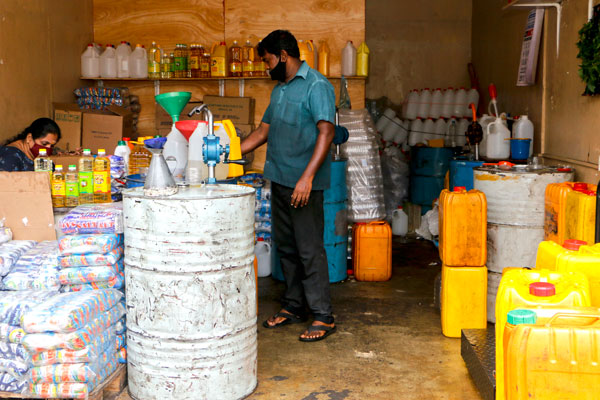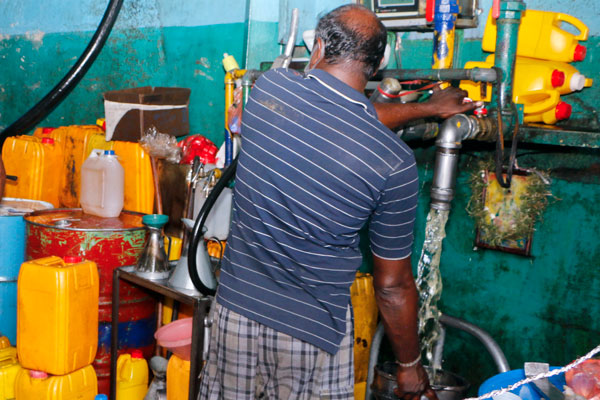News
Deadly oil readied for sale though toxins remain
Thirteen containers of crude coconut oil containing cancer-causing aflatoxin, which caused considerable controversy when detected late last year, have allegedly been refined in contravention of Customs law.
Importers are prohibited from making any changes to imported goods until analytical sample reports are provided to Sri Lanka Customs subsequent to a quality control test being performed by the Sri Lanka Standards Institution (SLSI) and the Food Control Administration Unit (FCAU) of the Ministry of Health.

Pic by Priyanka Samaraweera
Refining was carried out despite the FCAU sending Customs analytical sample reports stating that the coconut oil was not suitable for human consumption.
The head of the FCAU emphasised that even if the oil was refined, the aflatoxin it contains does not get destroyed.
It takes more than one week for the FCAU to provide sample reports and it is during that time that the stock of coconut oil was put through a refining process.
According to FCAU findings all 22 containers of crude coconut oil brought in by the importer contain aflatoxin. Coconut oil from 13 of the 22 containers has been refined.
A container can hold up to 18 metric tons of crude coconut oil. Responding to an inquiry by The Sunday Times, the Director-General of Customs, Major-General (ret.) Vijitha Ravipriya, said he would hold an inquiry. “If it is revealed that any importer has engaged in an illegal activity, legal action will be taken against that person,” he said.
On March 24, he said that stocks of oil from the containers in question were released to private warehouses of importers on permission granted by SLSI.
“But, we got to know on March 4 that two businessmen had imported 183,055 kilograms of coconut oil containing the carcinogenic, aflatoxin. I informed both these companies in writing on that same day to re-export these stocks of oil,” he said.
A media statement issued on Friday by the SLSI Director-General Dr. Siddhika Senaratne said contrary to some media and social media reports neither the SLSI nor any other authority had given approval for the sale of the oil to consumers.

The Consumer Affairs Authority is also carrying out a stringent watch on oil imports
“The Consumer Affairs Authority is also carrying out a stringent watch on these imports,” the statement said.
The statement named four oil importers – Ali Brothers Pvt Ltd, Sena Mills Refineries, Edirisinghe Edible Oils and Katana Refineries – for importing the stocks.
The Sunday Times contacted these companies but was told they would respond later.
FCAU Director Dr. Thilak Siriwardena said the authorities had known since last December that the containers of coconut oil had aflatoxin.
The normal procedure is that as soon as imported goods arrive at the harbour the SLSI and FCAU obtain samples of these items and then provide quality reports.
Normally, when stocks of oil are released to private warehouses of importers, Customs obtains a bank bond from the importers.
Customs internal sources said that once such a bank bond is obtained, Customs bears a strong responsibility to keep account of the goods at importers’ warehouses.
“We obtain a bank bond and then only release goods to private warehouses, with the trust and certification that importers will not make any changes regarding these goods,” a senior Customs official said on condition of anonymity.
“As Customs, we have to focus strong attention on whether these importers are doing something illegal to these goods.
“Customs Officers have not fulfilled their responsibilities regarding this. That is why importers have had the opportunity to refine these stocks of oil,” the official said.
The Director-General of Customs said if the oil had been refined illegally, steps would be taken to confiscate the importers’ bank bonds.
Director (Consumer Affairs and Information) of the Consumer Services Authority Asela Bandara said no quantity of the carcinogenic oil from the containers had been released to the market as yet.
“During the past few days, we inspected the private warehouses of the relevant importers. We observed that the stocks of coconut oil remain there. Therefore, there is no reason for people to get excited,” he said.
FCAU sources said to date only three importers had agreed to re-export oil stocks they had brought into the country. One importer has rejected the order to re-export his stocks of oil, saying he cannot accept the FCAU’s quality control reports and is requesting another report. This importer is also reported to have stated that aflatoxin is destroyed when the oil is refined.
This is incorrect, Dr. Siriwardena said, saying aflatoxin in coconut oil cannot be removed through refinement. Health officials pointed out that there was no other alternative to destroying foods that contain aflatoxin.
The President of the Public Health Inspectors’ Union, Upul Rohana, said inspectors, as is normal procedure, obtain samples of coconut oil from across the island and current collection is underway. “What remains for us to do is only to send the coconut oil samples we collect to the Government Analyst. Their report is due to be received within a month,” he said.


